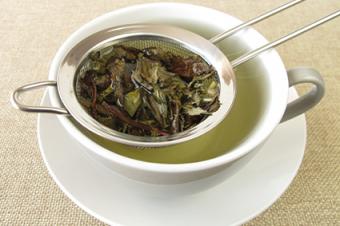
Morning sickness is a difficult symptom of pregnancy. For some women, it lasts throughout the day. It may be mild or severe and continue for a few months or your entire pregnancy. If you suffer with the condition, there are natural remedies you can try.
Herbal Remedies
Many herbs are used to combat nausea and vomiting, but just a handful are believed safe during pregnancy. The following herbs may relieve mild to moderate morning sickness. If your morning sickness is severe, and you cannot keep any food or water down, you should consult your doctor.
Dosage recommendations below are general. Your recommended dose may be different depending on your pregnancy. For exact dosing, consult your doctor, midwife, or natural health practitioner.
Cardamom
Cardamom is a spicy herb with antispasmodic abilities. Dr. Mao Shing Ni, a doctor of Chinese medicine and co-founder of Yo San University and the Tao of Wellness in California, states on his website that cardamom is used to treat morning sickness. It's usually consumed in tea form. To make cardamom tea, add a few cardamom pods to eight ounces of boiling water; steep, and strain. You can also make tea from ground cardamom. Use 1/4 teaspoon per eight ounce cup.
Fennel Seed

Fennel helps calm the digestive system. Chewing fennel seeds or drinking fennel tea is often prescribed to relieve morning sickness. To make fennel tea, add 1 to 1 1/2 teaspoons crushed fennel seed to one cup boiling water. Steep and strain. You can also purchase organic fennel tea bags.
Fennel seed is considered generally safe to use in food amounts. However, consult your health practitioner to see if fennel is appropriate for you. According to a study published in the Journal of Ethnopharmacology, fennel has properties that mimic estrogenic activity in the body.
Ginger
Ginger is a tried and true remedy for nausea. The University of Michigan Health System (UMHS) states on its website that ginger may help morning sickness after just a few days of use. To relieve morning sickness, UMHS recommends using ginger any of these ways:
- Take ginger capsules (250 mg, 4 times a day).
- Drink ginger tea by adding freshly grated ginger to hot water or purchasing organic ginger tea bags.
- Try ginger syrup, available at most natural food stores.
- Eat crystallized (candied) ginger.
The National Center for Complementary and Integrative Health (NCCIH) caustions pregnant women to consult their health care provider if they're thinking about taking ginger.
Peppermint

Peppermint has antispasmodic properties that help calm an upset stomach. It's commonly consumed in tea form, but you can also purchase peppermint capsules or peppermint candy. To make homemade peppermint tea, steep one teaspoon peppermint leaves in one cup of hot water for about ten minutes. Strain the tea before drinking. You can purchase organic peppermint tea bags at most grocery stores. You can also try chewing fresh peppermint leaves or adding fresh mint leaves to lemonade or water.
NCCIH indicates that peppermint is likely safe during pregnancy when used in amounts normally found in food, but large amounts should be avoided. PennState Hershey states on its website that you should not use peppermint if you have gastroesophageal reflux disease (GERD) or hiatal hernia, since it may worsen the disease.
Slippery Elm Bark
This mucilage-containing herb coats and soothes the stomach to relieve nausea. The American Pregnancy Association (APA) lists slippery elm bark as "likely safe" during pregnancy, as long as the inner bark is used in normal food amounts. Wake Forest Baptist Health cautions that there is concern the outer bark may cause miscarriage.
According to UMM, the adult dose of slippery elm bark tea is two tablespoons of powdered slippery elm bark in two cups of boiling water. Capsules containing 400 - 500 grams of slippery elm bark can be used three times daily. Lozenges are also available. Pregnancy doses may differ from normal adult doses.
Raspberry Leaf

Raspberry leaf is a popular natural remedy for morning sickness, as well as for pregnancy in general. According to the APA, raspberry leaf tea helps tone the uterus, promote milk supply, and relieve labor pains. However, the verdict is out on whether it's safe to use during the first trimester. If your morning sickness lasts beyond week twelve, check with your doctor about trying raspberry leaf for relief.
Reader's Digest's The Complete Illustrated Book of Herbs recommends on page 237 making a tea of raspberry leaf by infusing 4 to 8 grams of dried raspberry leaf in boiling water. Raspberry leaf tablets, tea bags or capsules are also available.
Use Under Supervision
The above natural remedies for morning sickness are generally considered safe for low-risk pregnancies when taken in low quantities. However, just because they are natural doesn't mean they can't have side effects. There are few studies on the impact of most herbs on a developing fetus. All herbs should be used under the supervision of a doctor, midwife or natural health practitioner.







